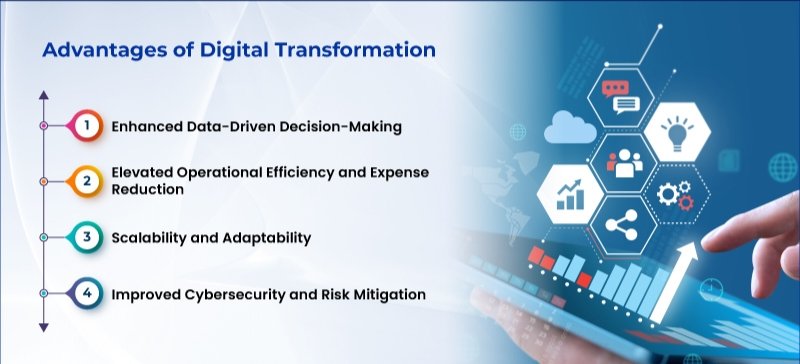A company undergoes a digital transition when it fully integrates technology. Technology is integrated across the entire organization rather than just occupying a specific space so that the company can go fully digital. If you want to embrace digital change to the fullest, think about simplifying the legal structure of your company with the best online LLC services. By doing this, you can improve your operational efficiency and find it simpler to adjust to new markets and technology while still adhering to legal requirements. What are the top five advantages of digital transformation for companies, then? Discover more below.
1. More robust security
Following a digital transformation, enhanced security will be available to you. In a time when thousands of cyberattacks occur daily and vast sums of money and data are stolen, this is vitally critical.
For instance, IoT security is currently very popular. This is the process by which a company protects all of its internet-connected devices, such as workplace gadgets and networked security cameras, against potential threats and cyberattacks. It makes perfect sense because it will ultimately provide improved protection for both your clients and staff.
2. A Cost-Reduction
The state of the world economy at the moment is not particularly good. Many firms are having trouble keeping up with the rapid inflation, so management teams are frantically scrambling to find ways to reduce expenses.
This is an illustration of how it functions: AI-driven customer support. “Traditional” customer service like phone calls has become antiquated in recent years. Customer service driven by AI has so taken over. Chatbots for customer service on websites are an example of this nowadays; they allow companies to offer customer support without the need for actual human workers.
3. Working From Home
Would you like to permit a portion of your staff to work remotely? If the response is in the affirmative, digital transformation is the only way you can do this.
Numerous different digital technologies are needed for Remote work, including:
- Collaboration software over the cloud (Microsoft 365, OneDrive, Google Meet)
- Employee monitoring software
- Software for sharing screens
- Employee tracking software such as Controlio
In other words, it won’t work to simply let your staff work from home in 2024 without any digital tools! Rather, your company needs to be technologically savvy and able to manage the demands of remote employment. You can successfully implement your remote work paradigm in this way.
4. Minimize Human Mistakes
Businesses can employ thousands of digital technologies available today to minimize or do away with human error entirely. Going digital reduces the need for time-consuming manual data entry and other processes that were previously performed by human staff. For instance, an accountant can use accounting software to automate a significant portion of their work, saving them time and effort compared to performing everything by hand. Consequently, this lowers the possibility of human error while ensuring that the financial aspect of things is handled. Really amazing, isn’t that right?
5. Improved Information Gathering and Interpretation
It is most likely true that your company has a ton of consumer data sitting around doing nothing. If so, this is something that has to change since gathering and evaluating data that can be used for improvement is at the core of modern corporate operations.
Following a digital transformation, you’ll be able to swiftly respond to emerging patterns in your customer data, such as the desire for cheaper delivery costs. Customers will be pleased as a result, and sales will increase and the company will grow faster. Among the newest tools for consumer insight software that you may utilize to get started are Python and Attest. You’ll soon question how your company managed to function without them.
